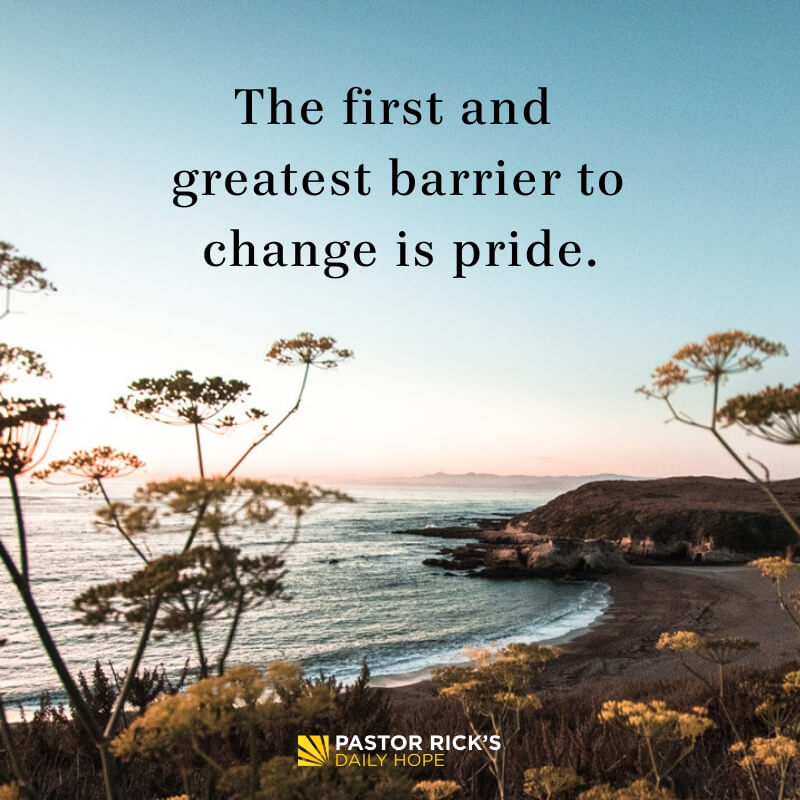You Don’t Have It All Together, and That’s Okay
by Rick Warren — January 28, 2019

“Do not think of yourself more highly than you ought, but rather think of yourself with sober judgment, in accordance with the faith God has distributed to each of you” (Romans 12:3 NIV).
The fact is, nobody has it all together. I don’t have it all together. You don’t have it all together. The Pope doesn’t have it all together. The Bible says nobody is perfect—period. Everyone on this planet is broken because of sin.
But we walk around trying to impress people and pretend like we’ve got it all together. The problem is that if you want lasting change in your life, you first have to humbly assess your current state and admit that you don’t have it all together. You have to admit you have a problem with your finances, your health, or wherever you’re struggling in your life.
Romans 12:3 says, “Do not think of yourself more highly than you ought, but rather think of yourself with sober judgment, in accordance with the faith God has distributed to each of you” (NIV).
Are you willing to ask the people closest to you, “Where do I need to change?” Do you have the courage to ask others to be honest about you and with you?
Why is this so important? Because you can only manage what you measure. If you don’t know the measure of your faith, you can’t grow in your faith. If you don’t know the measure of your health, you can’t develop and grow in health. If you don’t know the measure of where you are financially, you can’t set goals financially. If you don’t know the measure of where you are spiritually or vocationally or relationally, then you can’t grow in those areas. You can only manage what you measure.
It’s also important to record your progress in any goal—whether through a journal or a record or some other tool you want to use. If you’re going to set some health goals, financial goals, or any other kind of goal, record your progress throughout the year so you can measure your growth and your development.
Evaluate where you are so that you can know where you should go.
You Don’t Have It All Together, and That’s Okay
by RJ Hughes — January 25, 2019

“Do not think of yourself more highly than you ought, but rather think of yourself with sober judgment, in accordance with the faith God has distributed to each of you” (Romans 12:3 NIV).
The fact is, nobody has it all together. I don’t have it all together. You don’t have it all together. The Pope doesn’t have it all together. The Bible says nobody is perfect—period. Everyone on this planet is broken because of sin.
But we walk around trying to impress people and pretend like we’ve got it all together. The problem is that if you want lasting change in your life, you first have to humbly assess your current state and admit that you don’t have it all together. You have to admit you have a problem with your finances, your health, or wherever you’re struggling in your life.
Romans 12:3 says, “Do not think of yourself more highly than you ought, but rather think of yourself with sober judgment, in accordance with the faith God has distributed to each of you” (NIV).
Are you willing to ask the people closest to you, “Where do I need to change?” Do you have the courage to ask others to be honest about you and with you?
Why is this so important? Because you can only manage what you measure. If you don’t know the measure of your faith, you can’t grow in your faith. If you don’t know the measure of your health, you can’t develop and grow in health. If you don’t know the measure of where you are financially, you can’t set goals financially. If you don’t know the measure of where you are spiritually or vocationally or relationally, then you can’t grow in those areas. You can only manage what you measure.
It’s also important to record your progress in any goal—whether through a journal or a record or some other tool you want to use. If you’re going to set some health goals, financial goals, or any other kind of goal, record your progress throughout the year so you can measure your growth and your development.
Evaluate where you are so that you can know where you should go.


Connect with Pastor Rick Warren